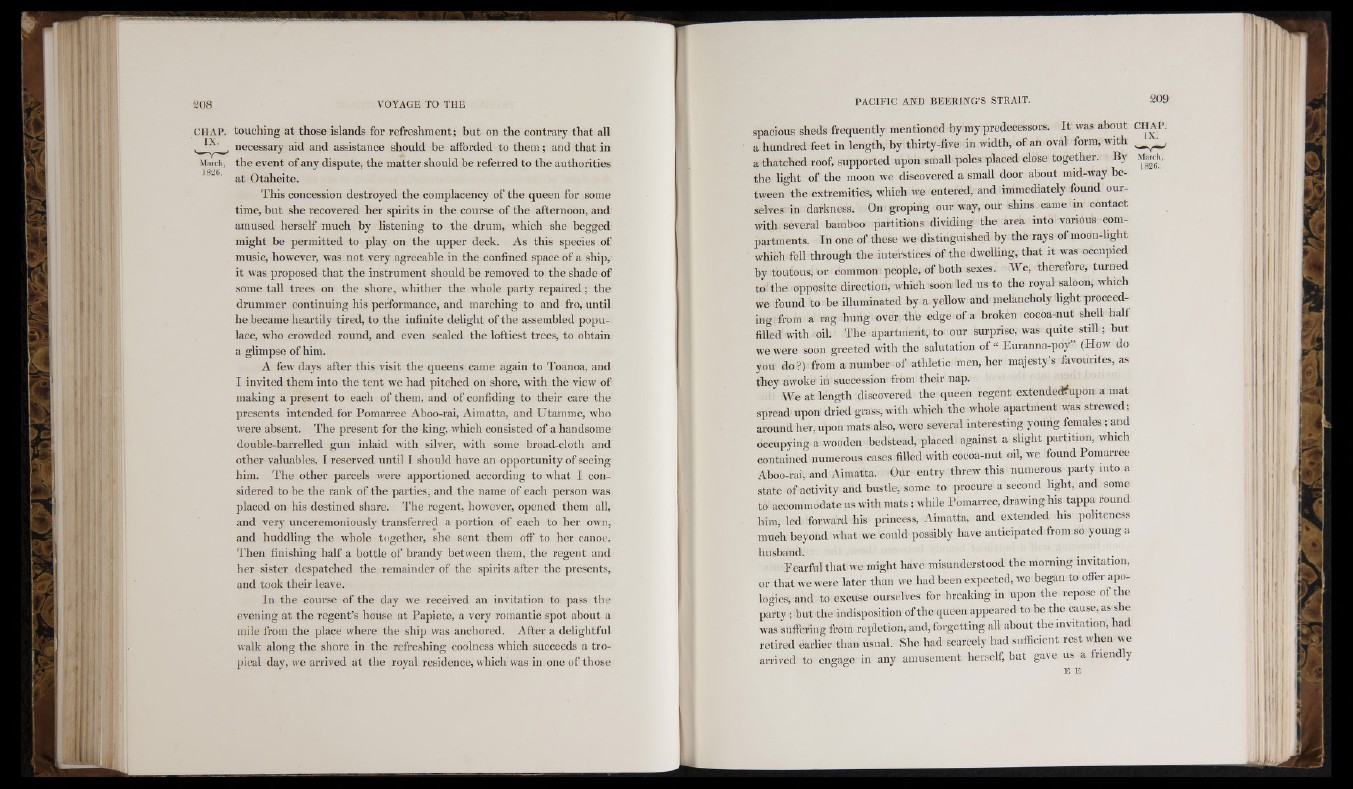
CHAP.
IX.
March,
1S26.
touching at those islands for refreshment; but on the contrary that all
necessary aid and assistance should be afforded to them; and that in
the event of any dispute, the matter should be referred to the authorities
at Otaheite.
This concession destroyed the complacency of the queen for some
time, but she recovered her spirits in the course of the afternoon, and
amused herself much by listening to the drum, which she begged
might be permitted to play on the upper deck. As this species of
music, however, was not very agreeable in the confined space of a ship,
it was proposed that the instrument should be removed to the shade of
some tall trees on the shore, wluther the whole party repaired; the
drummer continuing his performance, and inarching to and fro, until
he became heartily tired, to the infinite delight of the assembled populace,
who crowded round, and even scaled the loftiest trees, to obtain
a glimpse of him.
A few days after this visit the queens came again to Toanoa, and
I invited them into the tent we had pitched on shore, with the view of
making a present to each of them, and of confiding to their care the
presents intended for Pomarree Aboo-rai, Aimatta, and Utamme, who
were absent. The present for the king, which consisted of a handsome
double-barrelled gun inlaid with silver, with some broad-cloth and
other valuables, 1 reserved until 1 should have an opportunity of seeing
him. The other parcels were apportioned according to what I considered
to be the rank of the parties, and the name of each person was
placed on his destined share. I'he regent, however, opened them all,
and very unceremoniously transferred a portion of each to her own,
and huddling the whole together, she sent them off to her canoe.
Then finishing half a bottle of brandy between them, the regent and
her sister despatched the remainder of the spirits after the presents,
and took their leave.
In the course of the day we received an invitation to pass the
evening at the regent’s house at Papiete, a very romantic spot about a
mile from the place where the ship was anchored. After a delightful
walk along the shore in the refreshing coolness which succeeds a tropical
day, we arrived at the royal residence, which was in one of those
spacious sheds frequently mentioned by my predecessors. It was about CHAP.
a hundred feet in length, by thirty-five in width, of an oval form, with
a thatched roof, supported upon small poles placed close together. By
March,
182().
the light of the moon we discovered a small door about mid-way between
the extremities, which we entered, and immediately found ourselves
in darkness. On groping our way, our shins came in contact
with several bamboo partitions dividing the area into various compartments.
In one of these we distinguished by the rays of moon-hght
which fell through the interstices of the dwelling, that it was occupied
by ton tons, or common people, of both sexes. We, therefore, turned
to the opposite direction, which soon led us to the royal saloon, which
we found to be illuminated by a yellow and melancholy light proceeding
from a rag hung over the edge of a broken cocoa-nut shell half
filled with oil. The apartment, to our surprise, was quite still; but
we were soon greeted with the salutation of “ Euranna-poy” (How do
you do?) from a number of athletic men, her majesty’s favourites, as
they awoke in succession from their nap.
We at length discovered the queen regent extendedTupon a mat
spread upon dried grass, with which the whole apartment was strewed;
around her, upon mats also, were several interesting young females ; and
occupying a wooden bedstead, placed against a slight partition, which
contained numerous cases filled with cocoa-nut oil, we found Pomarree
Aboo-rai, and Aimatta. Our entry tlirew this numerous party into a
state of activity and bustle, some to procure a second light, and some
to accommodate us with mats ; while Pomarree, drawing his tappa round
him, led forward his princess, Aimatta, and extended his politeness
much beyond what we could possibly have anticipated from so young a
husband.
Fearful that we might have misunderstood the morning invitation,
or that we were later than we had been expected, we began to offer apologies,
and to excuse ourselves for breaking in upon the repose of the
party ; but the indisposition of the queen appeared to be the cause, as she
was suffering from repletion, and, forgetting all abont the invitation, had
retired earlier than usual. She had scarcely had sufficient rest when we
arrived to engage in any amusement lierself, but gave us a friendly
E E